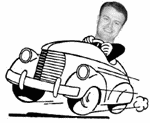I take it all back.
Last week I complimented Tim Eyman by likening him to an anarchist, with all the damage he is wreaking in the state with I-695. But now I see that he’s just another business shill faking a populist agenda in order to cover a corporate welfare giveaway.
Eyman has announced that he is launching a new “Traffic Improvement Initiative” campaign aimed at “solving” our state’s transportation and gridlock woes by funneling massive amounts of tax dollars to state highway construction. It would do this by redirecting dollars from Sound Transit, derailing the region’s mass transit boondoggle (not a bad thing) and replacing it with something far worse: a Roman-scale road-building spree that would force the state to spend more on highways and marginalize transportation alternatives and mass transit. In addition, this ballot measure would exempt highway construction materials from the state sales tax and plow “savings” back into road projects.
It’s a huge bonanza for the builders who have only been slowed, if marginally, by the fact that infrastructure hasn’t been able to keep up with the pace of massive new projects. Eyman says that Sound Transit is massive “social engineering,” but what is his proposal? Sound Transit is social engineering to get people onto trains and buses; Eyman’s is social engineering to get more people into cars. His plan spurs sprawl development more surely than Sound Transit will make transit converts. It is the closest thing you can get to a direct subsidy to developers and is tailor-made to fuel our region’s number one activity: growth.
Developers and their highway buddies have been “social engineering” for years. Kemper Freeman Jr. of Bellevue has long advocated massive road construction to “finish the grid” on the Eastside, and various legislators have advocated new area freeways, including one alongside Lake Sammamish. Dino Rossi, the pro-development Republican state senator from Issaquah, is eager to pass a law opening up the HOV lanes to single-occupancy cars on off-hours. And I-695 itself is social engineering too, taking local bus funds and, in essence, forcing more people to get to work by car.
Not only that, but now that I-695 has trashed the funding of the ferry system, especially passenger-only ferries, will it surprise anyone if we begin hearing new calls for more bridges across Puget Sound and to the islands, projects that could be funded by the cash Eyman intends to free up? The road builders in Olympia have long yearned to overlay the sound with concrete in order to aggressively spread development to the Olympic Peninsula, even the San Juans.
now author Edward Abbey said that unlimited growth was the philosophy of a cancer cell, and you can see how happy the Big Boys of the building lobby would be if this initiative passed: It would feed the cancer that is chewing this state up from the inside out. In the name of growth we are destroying the salmon, sacking the forests, and backing up rural residents to the Cascade or Olympic walls—in part because of our unwillingness to adapt to new circumstances. We are expanding and spreading and settling in long established patterns that are no longer sustainable. We are funneling too many people into too little space to have any hope of maintaining a lifestyle that even remotely resembles what we love—no, what is sacred—about this place.
While suburbanites in sprawl-impacted areas might think road building is the answer to traffic jams, it is in fact the opposite. Look, please, at Los Angeles or Orange County or Atlanta or any region where sprawl has gotten loose. The roads bring even more people, opening more rural and exurban lands to large home, low-density development—development that will eventually be filled in when we’ve finished carpeting the Puget Sound lowlands with people and concrete. The consequences of a road construction spree now 20 or 40 years out is, for me, nearly unthinkable.
Are we supposed to think that market forces aren’t social engineering even if they are dictated by laws engineered by politicians to favor business? Recently, I was on John Carlson’s KVI talk radio show with Seattle Post-Intelligencer business reporter Bruce Ramsey. John and Bruce were citing Hong Kong as a model example of the benefits of a free-trade, low-tax economy. As I sat there in the studio listening, I kept thinking of the teeming, polluted city of haves and have-nots called Hong Kong that I’ve visited. I don’t think most Seattleites would trade life here for life there, even if it is some kind of laissez-faire la-la land. In fact, life there is nearly the antithesis of what people here are seeking.
Tim Eyman is, I think, a brilliant tactician. He’s found a way to be Jesse Ventura without the charisma, the beef, or a vote of the people. He’s got a chicken-hearted governor in Olympia who is running scared and doing most of his work for him. The legislature is cowed by the margin of victory of I-695 and seems ready to let Tim be the boss. Eyman has quickly become the highest un-elected official in the state, and perhaps the most powerful.
But, so quickly, he’s overstepped himself. His strength is in being an agent of government reform. Now he’s proposing to remake the state according to a developer agenda, and he wants us to help in the name of “fixing” the mess government’s made.
Oh, get me my hip waders, it’s getting deep around here.







